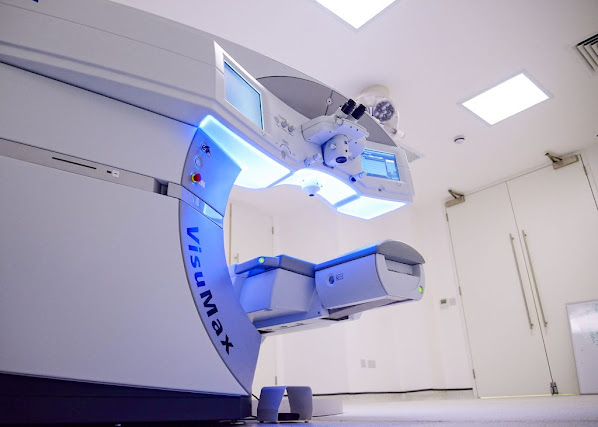What Is Laser Eye Surgery?
Laser eye surgery, also known as refractive or laser surgery, is a medical procedure that uses laser technology to reshape the cornea of the eye, with the aim of correcting common vision problems such as nearsightedness (myopia), farsightedness (hyperopia), and astigmatism. The cornea, the clear front part of the eye, plays a crucial role in focusing light onto the retina, allowing us to see clearly. During laser eye surgery, a laser precisely sculpts the corneal tissue, altering its shape to improve the eye's ability to focus light accurately.
There are different types of laser eye surgeries, with LASIK (Laser-Assisted In Situ Keratomileusis) being one of the most common. In LASIK, a thin flap is created on the cornea, and the underlying tissue is reshaped with a laser. The flap is then repositioned, allowing for a relatively quick recovery. Other procedures include PRK (Photorefractive Keratectomy) and LASEK (Laser Epithelial Keratomileusis), which also involve reshaping the cornea but differ in the way the corneal surface is prepared.
Laser eye surgery has proven to be a highly effective and popular method for reducing or eliminating the need for glasses or contact lenses, providing many individuals with improved vision and greater freedom from visual aids. However, not everyone is a suitable candidate and a thorough evaluation by an eye care professional is necessary to determine eligibility for the procedure.
Who Can Get Laser Eye Surgery?
Laser eye surgery is a popular and effective option for many individuals with common vision problems, but not everyone is a suitable candidate. The eligibility for laser eye surgery depends on various factors, and an eye care professional will assess these during a comprehensive eye examination. Generally, suitable candidates for laser eye surgery:
1. Stable Prescription: Candidates should have a stable vision prescription for at least one to two years before considering laser eye surgery. Rapid changes in prescription can affect the long-term success of the procedure.
2. Good General Health: Overall good health is important for a successful recovery. Conditions like autoimmune disorders or chronic illnesses may impact the healing process.
3. Adequate Corneal Thickness: The cornea needs to have sufficient thickness for the specific type of laser eye surgery chosen (e.g., LASIK, PRK). Thinner corneas may not be suitable for certain procedures.
4. Age Considerations: While there is no strict age limit, candidates should typically be at least 18 years old, as vision tends to stabilise by this age. However, older individuals can also undergo the surgery if they meet other criteria.
5. No Eye Diseases: Certain eye conditions, such as glaucoma, cataracts, and severe dry eye, may disqualify individuals from laser eye surgery. A comprehensive eye exam will identify any pre-existing conditions.
6. Realistic Expectations: Candidates should have realistic expectations about the outcomes of the surgery. While laser eye surgery can significantly reduce dependence on glasses or contacts, it may not achieve perfect vision, and some individuals may still need low-prescription glasses for specific activities.
7. Not Pregnant or Nursing: Hormonal changes during pregnancy and nursing can affect the stability of vision, so it's generally recommended to wait until after this period.
It's essential to consult with an experienced eye care professional or a refractive surgeon to determine individual eligibility for laser eye surgery. They will thoroughly evaluate the patient's eye health, medical history, and lifestyle to provide personalised recommendations.
At What Cost?
The cost of laser eye surgery can vary widely based on several factors, including the type of procedure, the geographic location of the surgery centre, the surgeon's experience, and the technology used. On average, in the United States, the cost of laser eye surgery can range from £2,000 to £3,000 per eye. However, more advanced procedures or specialised technologies may result in higher costs.
Here are some factors that can influence the cost:
Procedure Type
LASIK, PRK, LASEK, and other types of laser eye surgeries may have different costs.
Surgeon's Experience
Highly experienced and reputable surgeons may charge higher fees.
Technology Used
Advanced laser technologies and equipment may contribute to higher costs.
Geographic Location
The cost of living and demand for services in a specific area can impact the overall price.
Pre- and Post-Operative Care
Some clinics may include pre-and post-operative care in their package, affecting the total cost.
It's important to note that the cost typically covers the entire process, including pre-operative evaluations, the surgery itself, and post-operative follow-up appointments. Many clinics offer financing options to help individuals manage the cost of the procedure.
Additionally, it's crucial to choose a reputable and experienced surgeon and clinic, even if it means paying a slightly higher cost. Quality of care and the success of the procedure are of utmost importance when considering laser eye surgery. Patients should have a detailed discussion with their surgeon about costs, what is included in the fee, and any potential additional charges.





Comments
Post a Comment